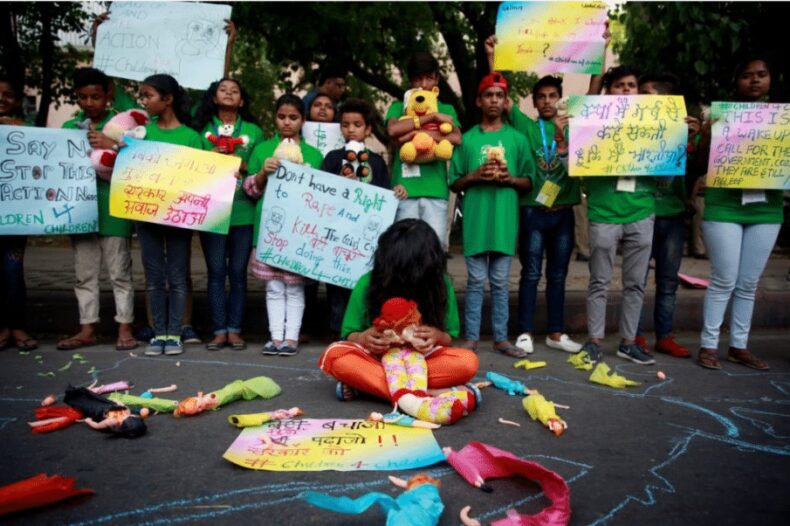Background Portrait
An eight-year-old girl was brutally gang-raped and killed in Kathua Village in 2019; this case is associated with that incident. Three individuals were given life sentences in the case by a Pathankot Special Court in June 2019. Three police officers were also given 5-year prison terms by the court for evidence destruction. The Juvenile Justice Board was given the case against Shubham Sangra. Shubham Sangra was the nephew of the primary defendant, Sanji Ram, who oversaw the temple where the offense was committed. Due to the obstruction of justice by attorneys who objected to the police detaining the defendant, the Supreme Court moved the case’s trial from Kathua to Pathankot in Punjab.
Supreme Court ordered that he be tried as an Adult

The Kathua chief judicial magistrate (CJM) and the Jammu and Kashmir high court’s decisions holding one of the accused in the 2018 Kathua rape and murder case to be a juvenile on Wednesday were overturned. The Supreme Court then ordered that he be tried as an adult. The Union Territory of Jammu and Kashmir’s appeal of the CJM and high court’s rulings was granted by a panel of judges that included Justices Ajay Rastogi and J.B. Pardiwala. As of right moment, Shubam Sangra is the defendant.
When the child was discovered dead on January 17, 2018, the case caused a national uproar. After some initial delays, the case was transferred to the Jammu and Kashmir Crime Branch on January 27 of the following year. The Crime Branch reported that the girl had been abducted, violently raped for four days, and then strangled to death.
Sangra allegedly played a role in the kidnapping, gang rape, and murder of the child, according to the chargesheet in the case that was submitted by the Crime Branch. Sangra was one of eight suspects in the investigation. “It is held that the respondent accused was not a juvenile at the time of the commission of the offence and should be tried the way other co-accused were tried in accordance with the law,” Justice Pardiwala said, reading out the operative portion of the order, according to LiveLaw.
“Medical opinion regarding age in absence of any other conclusive evidence should be considered to determine the age range of the accused…Whether medical evidence can be relied upon or not depends on the value of evidence,” the bench said.
Accused age, Medical Opinion
In the lack of any legislative proof on the same subject, the court concluded that a medical opinion regarding the age of an accused person cannot be “swept aside.”Sangra’s age was established as being between 19 and 23 on January 10, 2018, when the savage attack occurred, according to a report from a panel of medical experts that supported the inquiry. The report was written by specialists from multiple departments, including a physiologist, dental examiner, radiologist, and forensic scientist. Its conclusion was based on a number of clinical examinations as well as Sangra’s outward look.
Shraddha murder case: When crime scene became a ‘tourist spot’
Victim’s family Breathe Relief
The eight-year-old girl’s family, who is from the nomadic Bakerwal tribe, applauded the Supreme Court’s decision on Wednesday. The minor’s biological father, Mohammed Akthar, and adoptive father, Mohammed Yusuf, said they were encouraged by the verdict and felt that full justice would be served. “We welcome the judgement of the Supreme Court, and we are hopeful that we will finally get complete justice as Sangra is the main accused in the case,” Yusuf said. Relatives Yusuf and Akhtar, along with their families, arrived in the Samba district more than a fortnight ago after spending six months looking.
“We did not get complete justice so far as some of the convicted persons are already out on bail over the past year,” Akhtar said, referring to the release of former sub-inspector Anand Dutta and head constable Tilak Raj by the Punjab and Haryana high court, which suspended the rest of their sentences pending an appeal.
Yusuf claimed that although some developments, such as the defendants’ release on bond, had left them feeling defeated, the most recent verdict had given them great satisfaction because “we hope the victim will finally get justice.” After the Jammu and Kashmir government claimed that the high court had incorrectly upheld the judgment of a trial court holding him as a juvenile at the time of the offense in 2018, the top court suspended Sangra’s case before the Juvenile Justice Board on February 7, 2020.
READ MORE:Uttarakhand to make unlawful conversion non-bailable crime













